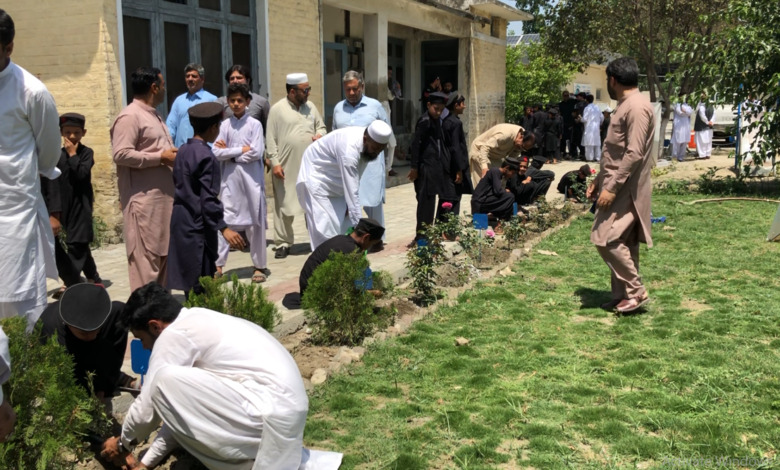
Iftikhar Khan
To prevent future disasters in the flood-affected area of Kot in Charsadda, a unique plantation project has been initiated. The project, called "Adopt a Tree", is a collaborative effort between the World Health Organization (WHO) and the Departments of Education, Health, and Forests. The objective is to involve school children by planting saplings in their names and entrusting them with the responsibility of nurturing the trees.
Forty children from government schools in Kot participated in the project and planted saplings at the Primary Health Center Kot. Each child pledged to take care of their designated tree personally. The Forest Department provided the saplings for the project.
Dr. Farhad, the District Health Officer of Charsadda, mentioned that WHO has provided financial support for the "Adopt a Tree" project. Initially, the plan was to plant 300 saplings at Kot BHU, but due to limited space, the remaining saplings will be planted at other locations.
Each tree is labeled with the name of the child who planted it, he furthered, adding that the initiative aims to not only reduce environmental pollution but also raise awareness among future generations about the benefits of trees.
Also Read: Beekeepers in KP Demand Promotion and Protection of Honey Industry
The area of Charsadda selected for this project experienced significant damage during last year's floods. The BHU chosen for the project was also affected by the flood. However, with financial support from WHO, the health center was repaired and equipped with modern facilities and equipment for better treatment.
In the past, Charsadda, like other districts in the country, has suffered extensively from floods. The breach of the Munda Headworks Bridge after an increase in water pressure in the Swat River resulted in severe flooding in Charsadda, affecting surrounding areas.
The flood caused substantial damage to various infrastructures, including crops, gardens, roads, schools, health centers, and houses. According to government data, more than 200,000 people were temporarily displaced in Charsadda due to the floods.
Comparing the damage caused by the 2022 flood to the devastating 2010 flood in Charsadda, statistics and government agencies report a reduction in losses. The district forest department attributes this reduction to extensive plantation efforts along the riverbanks.
Fazal Badshah, SDFO of the Forest Department, explained that despite the majority of land in Charsadda being used for agriculture, the department has successfully planted hundreds of thousands of trees as part of the Billion Tree Tsunami and Ten Billion Tree Tsunami projects over the past few years.
He furthered that approximately 600 hectares of land in the district, including 435 hectares of privately owned land, have been dedicated to various types of plantations. The forest department is responsible for caring for the trees on private land for three years, after which the ownership is transferred to the landowner through an agreement.
Along the banks of rivers and canals, known as "water locks", around 200 hectares of land have been utilized for tree planting. Water locks accommodate up to 4,300 trees per hectare, compared to 1,035 trees on normal land. Eucalyptus, Shisham (also known as Indian rosewood), and Kekar (Acacia nilotica, also known as Babul Tree) trees are predominantly planted in water locks.
SDFO emphasized that the government funding and facilities provided under the Ten Billion Tree Tsunami project will conclude in June this year. However, support from international organizations like WHO in plantation endeavors is highly appreciated.
Muhammad Zubair, the Deputy District Education Officer, expressed the Education and Health Departments' request for continued support from WHO to sustain and expand the "Adopt a Tree" project. Even if it's not possible to implement the project in all primary health centers, at least 50% of the centers can be equipped with similar plants and trees.
Zubair highlighted the numerous benefits of involving children in such initiatives, stating that it fosters their confidence in adults taking steps for their future. Furthermore, participating in such activities enhances their self-confidence and sense of responsibility. It is expected that these children will continue planting trees in their homes and neighborhoods with the same enthusiasm.